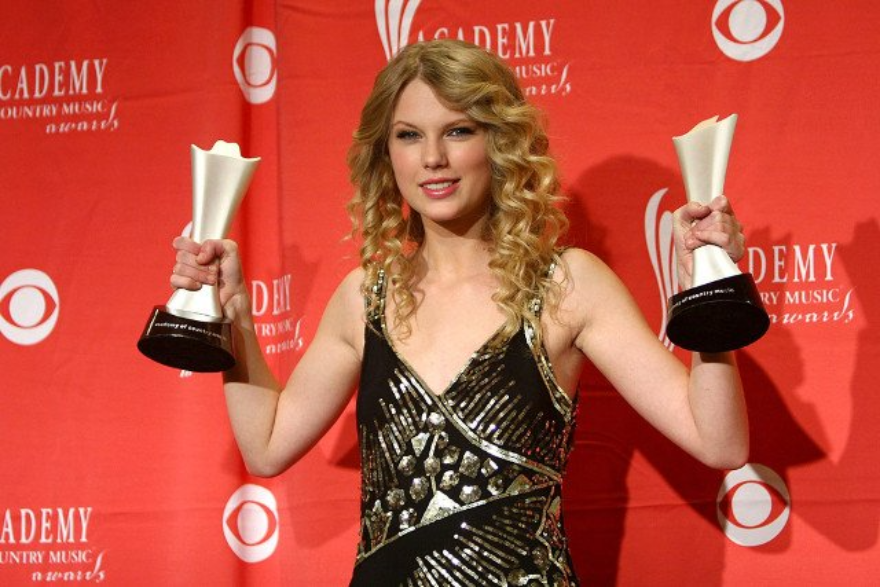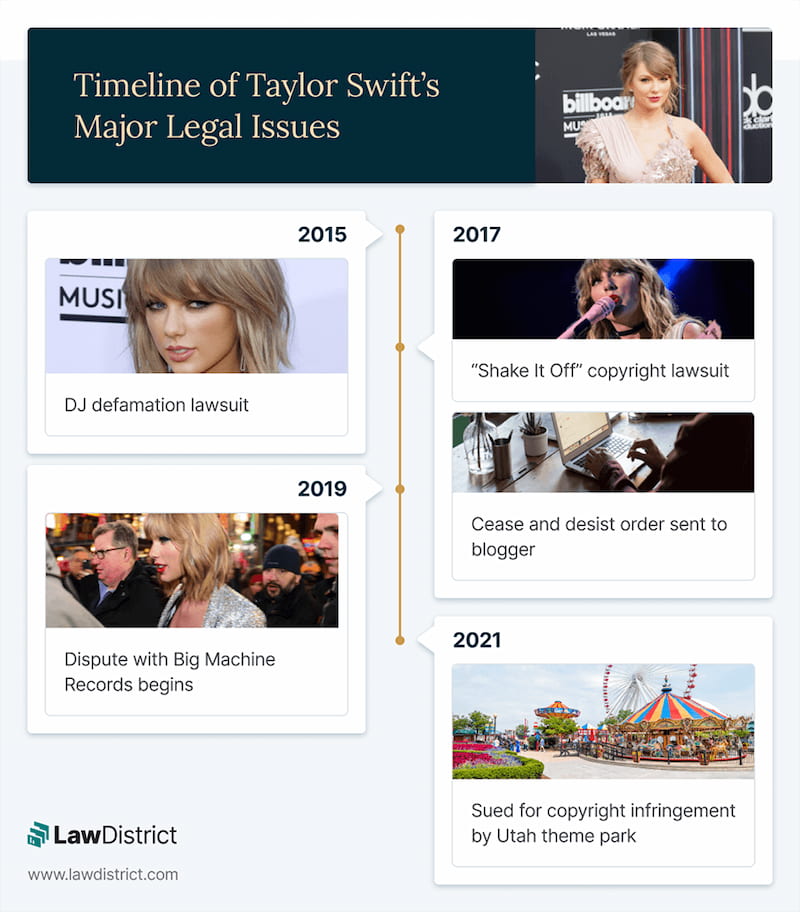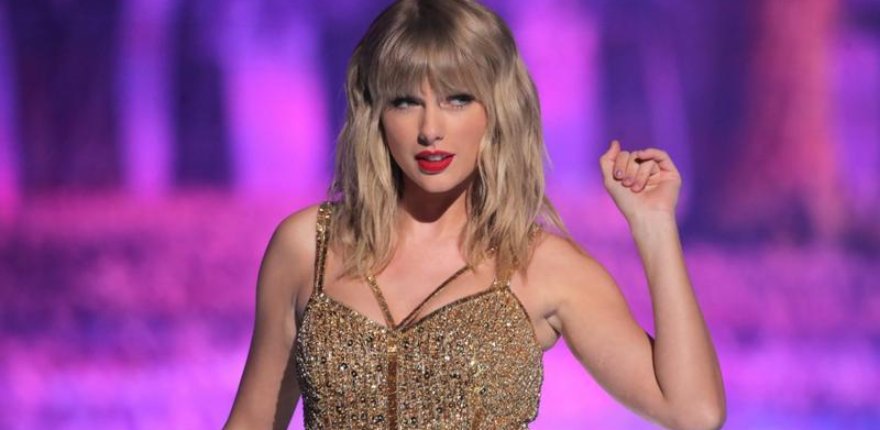When you hear “pop star,” who is the first artist that comes to mind? For many of us, that artist is Taylor Swift.
As you likely know, Taylor Swift is a name that’s recognized around the world. While she’s best known for her hit songs and innovative music videos, she’s also known for the controversy that seems to follow her.
Who can forget the “Hold up, imma let you finish but…” interruption by Kanye West at the 2009 MTV VMA’s?
Even though she hasn’t been a problematic artist, these controversies pop up and make noise in the press. From sexual harassment to intellectual property cases, Taylor is no stranger to legal conflicts.
To her credit, she always seems to have an intelligent response by using the correct legal documents and clever strategies to get the one up on those who try to take advantage of her. This is why they call her a mastermind.
As Taylor once said:
“Grow a backbone, trust your gut, and know when to strike back. Be like a snake—only bite if someone steps on you.”
We know that Taylor is a global pop sensation, but that doesn’t mean these situations can’t happen to you, so it’s better to have good karma.
So, learning a bit about what she’s gone through and how she’s handled these difficulties can help you prepare for a similar legal situation.
Now, let’s take a look at who Taylor is, what she’s come up against, and how she’s dealt with it.
Signing With Big Machine Records
Taylor Swift was born in Pennsylvania in 1989 and signed with Big Machine Records in 2005 as their first artist. Her deal was a 13-year contract that would end in 2018.
While being signed with the record label, she released her first 6 albums:
- Taylor Swift
- Fearless
- Speak Now
- Red
- 1989
- Reputation
Big Machine Records had the right to release the media created in each album’s recordings. Just as important, the record label also had exclusive ownership of each of Taylor’s first 6 album’s masters, creating a delicate situation.
Taylor Swift vs. Big Machine Records
Taylor signed a deal with the record label that was standard in the music industry. Yet it laid the groundwork for a controversy related to the copyright of the original recordings of Taylor’s songs created with the label.
Swift never attempted to terminate her contract with her first record label. Instead, in 2018, Taylor wanted to purchase the masters before the contract expired.
This never happened, as according to Swift’s attorney, the label would only sell the masters to Swift if she signed a new deal. The plot thickened in 2019 when Scooter Braun’s Ithaca Holdings acquired Big Machine Records, gaining control over Swift's early music catalog.
Allegedly, Scooter Braun would not let Swift perform songs from her first 6 albums at the 2019 American Music Awards unless she re-signed with Big Machine Records.
Swift voiced her dismay publicly, igniting a conversation about artists' rights and the role of big labels in the music industry, causing bad blood between both parties.
 Taylor in her early years posing with country music awards
Taylor in her early years posing with country music awards
How U.S. Copyright Law Played a Factor
To understand the whole situation, it's important to know a bit about copyright laws.
Here's the key: as explained before, Big Machine Records owned the masters, but Swift owned the publishing rights to her songs, which she wrote herself.
This nuance allowed Swift to create a clever plan to perform her songs again without fear of legal retaliation.
The Solution: Re-Recording Her First 6 Albums
Now look what they made her do, Swift decided to embark on a path less traveled. She reclaimed ownership by beginning the process of re-recording her old albums.
Since Taylor Swift retained the rights to her compositions, she could re-record her albums, creating new masters that she would own outright. It was a bold move to regain control over her artistic legacy, which she may have gotten the idea from another artist, Kelly Clarkson.
At the moment, the artist is currently still re-recording her first 6 albums, so she’s not out of the woods yet. She’s already released Fearless, Red, and Speak Now, with 1989 on the way.
Swiftie Effect: Winning in the Court of Public Opinion
While the re-recordings were seen by some as a huge risk and even a bluff, the albums that have been re-released have seen huge commercial success, proving that she is, indeed, the man.
Each of the re-recordings landed at number 1 on the Billboard 200, and her latest release has sold over 700,000 units. The pre-orders for her latest re-recording have already crossed the million mark as well.
It’s also important to note the impact that Swift’s fans (also known as “Swifties”) have had.
Throughout the dispute with Big Machine Records, Swift’s fans have provided endless support.
The pop star’s fans also heavily criticized the record label while also supporting Swift.
Other musical artists such as Snoop Dogg and Dave Grohl have also mentioned how clever it was for Swift to re-record her songs.
Other Legal Controversies
For Taylor Swift, the dispute with her old label may be the most well-known, but it isn’t the only legal issue during her career that has tried to prevent her from being bejeweled.
Some other disputes the pop star has had to face include:
Timeline of Taylor Swift’s Major Legal Issues

DJ Defamation Lawsuit
In 2013, Swift accused David Mueller, a DJ, of groping her. The DJ filed a defamation lawsuit against Taylor when he was fired for sexually assaulting her, claiming damages for his lost earnings.
Swift won the defamation case in 2015 and eventually countersued the DJ for sexual assault. She won the countersuit, and Mueller was then forced to pay a symbolic $1 in damages. That was better than revenge, for sure.
“Shake It Off” Copyright Lawsuit
Swift had a lawsuit against her, claiming she stole lyrics from a song, leading to a lawsuit against the singer in 2017.
Songwriters Sean Hall and Nathan Butler accused Taylor Swift of infringing upon the lyrics of their 2001 song “Playas Gon' Play” in her hit “Shake It Off.”
The songwriters have since dismissed their case with prejudice, and it cannot be refiled.
Cease and Desist Order Sent to Blogger
In 2017, Taylor Swift's legal team issued a cease and desist letter to a blogger who wrote a post connecting the pop star to the alt-right movement, but she’s not that big of an anti-hero.
The post suggested that Swift's music was an anthem for white supremacists and asked the singer to denounce white supremacy. Swift's legal team asserted that the allegations were baseless and harmful, demanding the post be retracted.
Take advantage of a cease and desist letter to end damaging behavior towards you, just like Taylor did in 2017.
Get a Cease and Desist Letter
Copyright Infringement Lawsuit from Theme Park
In 2021, a theme park named “Evermore,” in Utah claimed that Swift's album “Evermore” violated their trademark rights.
The theme park argued that the album's release caused confusion, leading visitors to believe there was a collaboration between the park and the artist.
Swift's legal team refuted the claims, stating that there was no possibility of confusion between the album and the theme park, and Evermore had to tolerate it.
How to Avoid Disputes Like These
In the wake of Taylor Swift's well-publicized conflicts, it stands to reason that being legally prepared can help you avoid trouble and protect your interests.
Here, we break down Swift’s experiences into advice for day-to-day situations:
- Non-disclosure agreements (NDAs): Much like how artists protect their creative secrets, use a Non-disclosure agreement template to shield your personal or business-related confidential information.
- Release forms: Before allowing someone to handle your intellectual property, you should obtain a release. Utilize a media release form to create terms when someone wants to use your media. The form can act as protection from potential legal hassles.
- Clarity in contracts: Using contracts with clear terms, especially regarding termination provisions, to avoid disputes like the Swift-Big Machine saga.
Taking a page out of Swift’s book, such as having a basic understanding of documents and the right strategy, will help you get through any unwanted or unexpected legal issues!
You just have to shake it off and step forward with a fearless mindset to legally protect your wildest dreams.

 Taylor in her early years posing with country music awards
Taylor in her early years posing with country music awards

